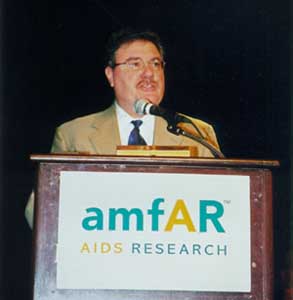-
- Dean admits stand on gay rights may cost votes
- Gay-rights activists seek stronger hate crimes law
- Group says South gets short shrift in AIDS money
- Gov. Davis signs AB205
- Law schools sue Department of Defense
- Former San Francisco health commissioner prosecuted for HIV infection
- IU chancellor condemns professor’s anti-gay web log
- It’s not your father’s fraternity
- National News Briefs
- World News Briefs
national
Group says South gets short shrift in AIDS money
Federal funds concentrated in cities with higher infection rates
Published Thursday, 25-Sep-2003 in issue 822
NEW ORLEANS (AP) — The South gets short shrift when it comes to federal AIDS money, and an additional $122 million a year is needed to erase the inequality, health officials from the region say.
Caseloads in the region are growing but federal money isn’t keeping pace, officials from 14 states and Washington, D.C., told a national conference of AIDS/HIV workers on Wednesday.
They said they would ask Congress for the money, for risk-reduction education, medical care, housing and programs that help people get expensive antiviral prescriptions.
The South had 39 percent of the nation’s AIDS diagnoses in 2001, the latest year for which such figures are available, according to the federal Centers for Disease Control and Prevention.
But Southerners with HIV get nearly eight percent less money for treatment than their counterparts nationwide, and almost 11 percent less for prevention programs, according to the North Carolina Department of Health.
“It’s unfair for HIV-infected individuals to not have adequate care,” said Thomas Liberti, chief of the HIV/AIDS bureau in the Florida Department of Health. “It’s in our nature to fight a disease and see gains. We know we can’t as long as we’re fighting with one hand behind our backs.”
The disparity isn’t caused by any sort of prejudice, the group said, but because federal money is weighted toward cities with large numbers of cases, such as New York, Miami and New Orleans.
Many Southern states don’t have concentrations of the illness, said Evelyn Foust, director of programs for AIDS and sexually transmitted diseases in North Carolina’s Department of Health and Human Services.
In addition, many doctors in the rural South aren’t familiar with AIDS, making it difficult to get care, the health officials said. For that reason and because HIV-infected people may be reluctant to disclose their condition in some regions, infected people often don’t seek care until their disease is advanced, Foust said.
The group wants $25.5 million for prevention programs, nearly $34.6 million for basic care, $48.6 million to help people pay for prescriptions and about $13.1 million to pay for housing.
That amount should be available every year “until the Southern states’ crisis is, based on epidemiological data, over,” a statement said.
Federal money often is the only hope for HIV-infected Southerners, Foust said, because they live in states that have cut back on health programs because they are facing big budget deficits.
The group’s complaint coincides with the meetings of the Southern AIDS Coalition Conference and the U.S. Conference on AIDS both in New Orleans.
|
|
Copyright © 2003-2025 Uptown Publications


